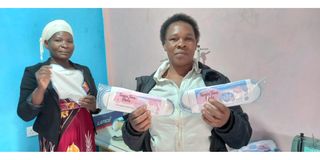Migori Jua Kali women keeping girls in school

Mary Otieno (left) and Elizabeth Achieng’, members of Migori Jua Kali Women Group at their tailoring yard in Migori town on September 17, 2021.
What you need to know:
- Jua Kali Women Group in Migori town makes reusable sanitary towels christened Tumia Tena to support needy girls.
- They initiated the process after realising girls from informal settlements dropped out of school for lacking the vital commodity during their menses.
At the centre of Migori town lies Jua Kali Estate, an informal workplace synonymous with artisanal craftsmanship. Here, a group of women are engrossed in making reusable sanitary towels christened Tumia Tena pads, loosely translating to ‘use again’ in Swahili.
The group of 12 started manufacturing pads after learning about the predicament of teenage girls who were dropping out of school during their menses.
Jua Kali Women Group started in 2013 as a merry-go-round where members could meet twice a week and make little contributions.
“We contributed Sh500 at every meeting. It was table banking but an idea struck us. Being in a slum neighbourhood, we saw young women struggling during their menses; and an idea to help them came up,” recounts Scholastica Awino a group founder.
Table banking
Armed with proceeds from the table banking, the group sourced materials from Nakuru Town and started making the pads.
“Selling the pads was tricky at the onset since people were not familiar with the products” Ms Awino says.
Judith Awuor, the group chairperson tells nation.africa that they initiated the process after realising girls from informal settlements dropped out of school for lacking the vital commodity during their menses.
“We thought of ways of keeping the girls in school. Majority from humble backgrounds would be lured into illicit sex in exchange for the pads,” she says.
She adds: “We worked on a grant proposal to jump-start our idea. Fortunately, it attracted a US-based donor who was willing to support our initiative.”
The group started making pads and the initiative gradually grew into a full blown enterprise. In 2015, they rented a room within Jua Kali, hired sewing machines and started making the pads, which they distributed within the neighbouring Pand Pieri slum, for free.
As demand grew and the production costs sky-rocketed, the group partnered with Migori Rotary Club that purchased their products and distributed to estates and schools.

The group manufactures reusable sanitary towels, which they distribute to schools.
A pack of three pads retails at Sh500 although the group offers incentives to bulk buyers. Their first sale to the rotary club in 2018, netted Sh600,000 which they used to buy their own machines. The rotary club again bought another batch worth Sh400,000.
They bought a room where they currently operate from. Among the schools they supply with pads include Nyangubo Girls Secondary, Bande Mixed Secondary, Radienya Girls, Osingo Mixed Secondary and Muslim Primary School. Migori Township Secondary School deputy principal Gladys Achieng’ says the group’s input has seen more girls remain in school.
“Many needy girls avoided school, while some fell victim to men who lured them with pads before impregnating them,” she recalls.
Ms Achieng’ says the group’s initiative has gone a long way in supporting the war against teenage pregnancies. The group initially faced a challenge of marketing the products in schools as girls shied off from taking the pads.
“It was hard to convince the girls, especially those in secondary schools, that the pads could be washed, sun dried and reused,” says Mary Otieno, a member of the group.
Ideal and eco-friendly
She adds: “We had to sensitise them on the benefits of using the pads and convince them that they are ideal and eco-friendly.”
The onset of Covid-19, however, saw sales decline drastically forcing the group to start making masks, which the rotary club supplied to schools.
“They still purchased our pads but in low quantities. Gradually, they scaled down, before finally stopping, citing tough economic times. Our table banking too, could not sustain the project so we scaled down our operations,” notes Ms Awuor.
She says prices of raw materials have increased threefold, making it difficult to produce the merchandise in bulk.
“Materials are so expensive and coupled with high fuel prices, we are staring at a crisis. A roll of soft cotton that used to cost Sh50,000 now goes for Sh120,000. Waterproof material was Sh35,000 but has doubled to S 70,000,” she says.
The group now calls on organisations to support their business by buying their products.
“We are registered with the Ministry Trade and Industrialisation as an enterprise, and certified by Made in Kenya who gave us a clearance certificate,” she says.




